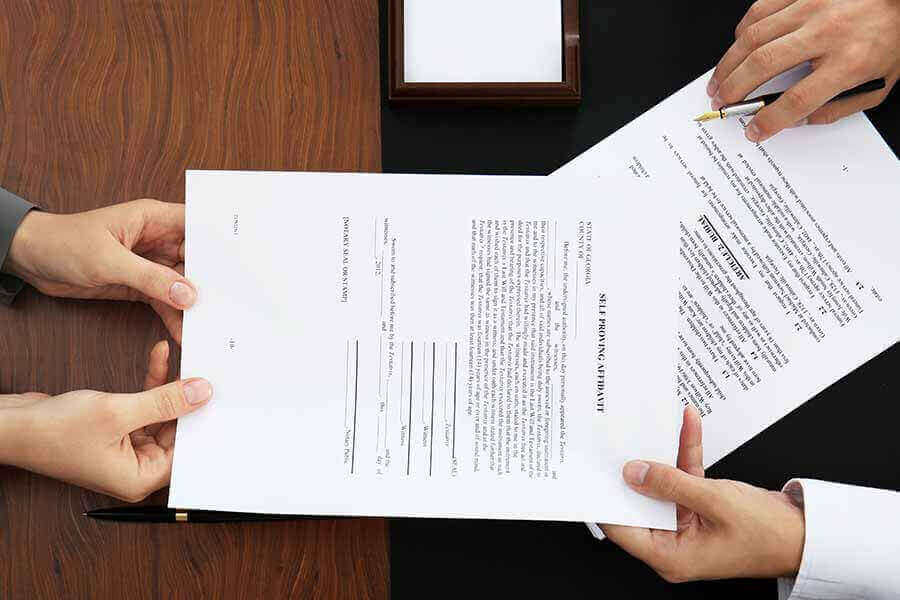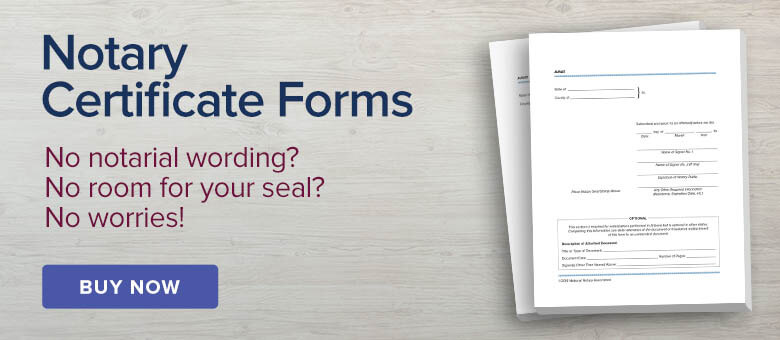
Two of the most common questions Notaries ask the NNA are “Can I notarize a document from another state?” and “Can I notarize a document that uses notarial wording from another state?”
While most Notaries are familiar with the certificate wording of their own state, requirements regarding that wording vary greatly from place to place, and out-of-state certificates often include unfamiliar, even confusing, wording.
Some states prescribe the exact wording that certificates must use. Other states offer general guidelines. In some cases, it is left entirely up to the Notary to determine if the wording on a particular certificate is acceptable.
So how do you deal with a Notary certificate that comes from another state?
Comply with your own state’s Notary certificate laws
In most states, the general rule is that certificates must comply substantially with the requirements found within their statutes.
For example, many states say that an acknowledgment certificate is sufficient as long as it contains the words “acknowledged before me” or an equivalent of that phrasing, still leaving the exact wording somewhat open.
In these states, a Notary may use a certificate from another jurisdiction as long as the Notary follows all of the requirements for the notarization in the Notary’s state. This typically means the signer must personally appear before the Notary and be properly identified, and sign, or acknowledge signing, the document. However, the actual certificate wording describing these actions may vary.
In California, Notaries cannot complete jurat or proof of execution certificates that come from out of state. Instead, they must use a separate certificate that exactly matches state-required wording. They may, however, complete an out-of-state acknowledgment certificate as long as the document will be filed outside of California and the wording doesn’t require the Notary to certify that the signer holds a representative capacity or make other determinations not allowed by law.
In Florida, every jurat and acknowledgment certificate completed by a Notary — whether issued in or outside of the state — must contain 9 specific elements and be substantially in the form prescribed in the statute. This gives Florida Notaries some leeway in completing out-of-state certificates, as long as the certificates include all of the required elements and the wording generally conforms to the examples in state law.
In Texas, the state provides suggested certificate wording for Notaries to use, but permits Notaries to use different wording as well.
If you have any questions about your state’s requirements, contact your state Notary agency or the NNA Hotline.
Quick tips for out-of-state Notary certificates
Tip #1: Determine the type of notarization the out-of-state certificate requires.
If you are unfamiliar with the style and wording of the notarial certificate, read through it for keywords and phrases — such as “acknowledged,” “subscribed and sworn to” or “signed and sworn to” — which will help you determine what type of notarization is required.
Tip #2: Check the out-of-state Notary certificate's venue.
The “venue” field in a notarial certificate must always reflect the state and county where the notarization is performed — not necessarily where it was prepared or where it will be filed. If the certificate comes with another venue filled in, cross through it and enter the correct information.
Tip #3: Determine if the certificate wording variations are major or minor.
If you are in a “substantial compliance” state, check the certificate on the document against the statutory form, usually found in your state’s Notary handbook.
If the statutory form requires you to enter the date of notarization, but the out-of-state certificate does not, this could be an indication that the out-of-state form is not compliant.
If the statutory form reads, “Before me, John Smith, Notary Public…” and the out-of-state wording reads, “Before me, the undersigned Notary Public of said state…,” then the certificate is probably acceptable.
Tip #4: When in doubt, attach a separate certificate.
If you have any doubts about the out-of-state certificate, play it safe and replace it with one of your own. But first, have your signer verify that a separate certificate would be acceptable.


Related Articles:
Quiz: Cross-border Notary issues
Notarizing documents from other countries
Additional Resources:
Notary Essentials